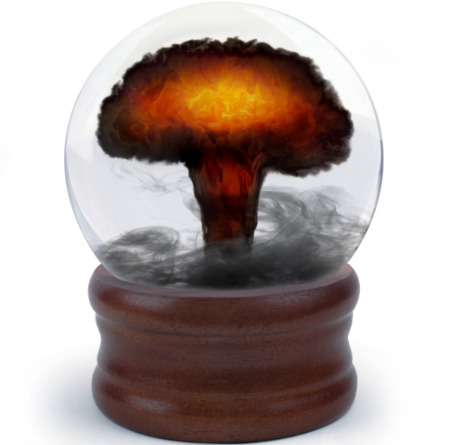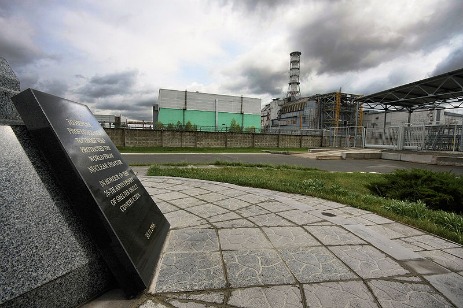Ukraine
-
Chernobyl site could become a solar farm
Ukraine is seeking investors for a big solar installation on land contaminated by the 1986 nuclear disaster.
-
Magical tree tunnel was carved out by a train
In Klevan, Ukraine, this two-mile long tunnel of trees was formed when the vegetation grew around the path of a regularly passing train. Locals calls this beautiful and romantic place the Tunnel of Love. Even without the green, leafy border, it’s haunting.
-
Why is no one talking about how bad the Japan nuke disaster could be?
Let’s hope the future doesn’t hold this. This is adapted from a post at TomDispatch; you can read the longer version here. “Not as bad as Chernobyl”? It might be better to describe the situation at Japan’s Fukushima nuclear plant as “remarkably unlike Chernobyl” in rural Ukraine, where, almost 25 years ago, a single uncontained […]
-
At Chernobyl, it was all under control
A memorial rests in the shadow of the Chernobyl nuclear plant.Photo: Matti PaavonenThis piece was written by John Perlin. As a visiting scholar last year at the Linz Institute for Organic Solar Cells, I met Valery N. Bliznyuk, a visiting professor at Linz and a permanent faculty member at Western Michigan University. His fascinating work in […]
-
Cheap oil: Be careful what you wish for
This guest essay was originally published on TomDispatch and is republished here with Tom's kind permission.
-----
Only yesterday, it seems, we were bemoaning the high price of oil. Under the headline "Oil's Rapid Rise Stirs Talk of $200 a Barrel This Year," the July 7 issue of the Wall Street Journal warned that prices that high would put "extreme strains on large sectors of the U.S. economy." Today, oil, at over $40 a barrel, costs less than one-third what it did in July, and some economists have predicted that it could fall as low as $25 a barrel in 2009.
Prices that low -- and their equivalents at the gas pump -- will no doubt be viewed as a godsend by many hard-hit American consumers, even if they ensure severe economic hardship in oil-producing countries like Nigeria, Russia, Iran, Kuwait, and Venezuela that depend on energy exports for a large share of their national income. Here, however, is a simple but crucial reality to keep in mind: No matter how much it costs, whether it's rising or falling, oil has a profound impact on the world we inhabit -- and this will be no less true in 2009 than in 2008.
The main reason? In good times and bad, oil will continue to supply the largest share of the world's energy supply. For all the talk of alternatives, petroleum will remain the number one source of energy for at least the next several decades. According to December 2008 projections from the U.S. Department of Energy (DoE), petroleum products will still make up 38 percent of America's total energy supply in 2015; natural gas and coal only 23 percent each. Oil's overall share is expected to decline slightly as biofuels (and other alternatives) take on a larger percentage of the total, but even in 2030 -- the furthest the DoE is currently willing to project -- it will still remain the dominant fuel.
A similar pattern holds for the planet as a whole: Although biofuels and other renewable sources of energy are expected to play a growing role in the global energy equation, don't expect oil to be anything but the world's leading source of fuel for decades to come.
Keep your eye on the politics of oil and you'll always know a lot about what's actually happening on this planet. Low prices, as at present, are bad for producers, and so will hurt a number of countries that the U.S. government considers hostile, including Venezuela, Iran, and even that natural-gas-and-oil giant Russia. All of them have, in recent years, used their soaring oil income to finance political endeavors considered inimical to U.S. interests. However, dwindling prices could also shake the very foundations of oil allies like Mexico, Nigeria, and Saudi Arabia, which could experience internal unrest as oil revenues, and so state expenditures, decline.
No less important, diminished oil prices discourage investment in complex oil ventures like deep-offshore drilling, as well as investment in the development of alternatives to oil like advanced (non-food) biofuels. Perhaps most disastrously, in a cheap oil moment, investment in non-polluting, non-climate-altering alternatives like solar, wind, and tidal energy is also likely to dwindle. In the longer term, what this means is that, once a global economic recovery begins, we can expect a fresh oil price shock as future energy options prove painfully limited.
Clearly, there is no escaping oil's influence. Yet it's hard to know just what forms this influence will take in the year. Nevertheless, here are three provisional observations on oil's fate -- and so ours -- in the year ahead.
-
A big train wreck leaves it all over the place
Gristmill reader Grevangelical was in Ukraine when this happened, and he says people there are nervous about it. Wonder why? Deputy Prime Minister Olexander Kuzmuk, who on Tuesday compared the spill to the 1986 Chernobyl nuclear disaster, has since insisted there is no health risk to surrounding villages … By the way, the highly toxic […]
-
Ukrainian attorney Olya Melen stands up for the Danube Delta
Olya Melen doesn’t think small. In her first-ever court case, the young Ukrainian attorney challenged a massive canal project proposed for the Danube Delta, an internationally recognized wetland on the edge of the Black Sea. Melen, a lawyer for the public-interest group Environment-People-Law, argued that the canal would disrupt the area’s rural communities and diverse […]
-
Meet this year’s winners of the Goldman Environmental Prize
The winners (left to right): Silas Kpanan’Ayoung Siakor, Yu Xiaogang, Tarcísio Feitosa da Silva, Anne Kajir, Olya Melen, and Craig Williams. Photo: Goldman Environmental Prize. Though the connection between people and their surroundings is undeniable — a serving of clean air, anyone? — defense of the environment is still sometimes considered antisocial behavior. But this […]



